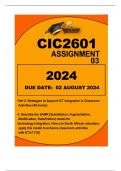,CIC2601 ASSIGNMENT 03
DUE DATE 02 AUGUST 2024
Part 1: Understanding ICT Integration in South African Schools (40 marks)
1. Define ICT (Information and Communication Technologies) and explain why
its integration is
crucial in the context of South African education. [10]
Definition of ICT (Information and Communication Technologies)
Information and Communication Technologies (ICT) refer to a broad range of
digital tools and resources that facilitate the access, exchange, and management
of information. This encompasses various technologies such as computers, the
internet, telecommunication devices, software applications, and digital platforms
that enable communication, information processing, and collaboration among
users. In an educational context, ICT includes content creation tools, learning
management systems, and multimedia resources that enhance teaching and
learning experiences.
### Importance of ICT Integration in South African Education
1. **Enhancing Learning Outcomes**: ICT integration in schools provides learners
with diverse educational resources and interactive learning environments.
Engaging tools like multimedia presentations, educational software, and online
resources cater to different learning styles and paces, increasing overall academic
performance.
2. **Access to Information**: The internet offers vast repositories of knowledge,
enabling students and teachers to access a wide array of information beyond
traditional textbooks. This encourages independent learning and fosters critical
thinking as students can evaluate various sources of information.
3. **Bridging the Digital Divide**: South Africa faces significant disparities in
access to quality education, predominantly between urban and rural areas. By
, integrating ICT, schools can help bridge this digital divide, ensuring that learners
in underserved communities have access to updated resources and learning
opportunities.
4. **Preparing Learners for the Future**: Proficiency in ICT is essential for success
in the modern workforce. By incorporating these technologies into the
curriculum, South African schools equip students with vital skills such as digital
literacy, problem-solving, and collaborative working, which are crucial in today’s
job market.
5. **Facilitating Communication and Collaboration**: ICT tools enhance
communication between teachers, students, parents, and the community.
Platforms such as online forums, learning management systems, and educational
apps enable ongoing collaboration, support parental involvement, and create a
connected learning community.
6. **Professional Development for Educators**: Integrating ICT not only benefits
students but also offers professional development opportunities for educators.
Training teachers in ICT tools and resources empowers them to innovate their
teaching practices and engage students more effectively.
7. **Promoting Flexible Learning**: ICT integration allows for varied instructional
methods, such as blended or flipped classrooms, where traditional learning
environments are combined with online learning. This flexibility can
accommodate different learning needs and lifestyle choices, promoting
inclusivity.
8. **Encouraging Lifelong Learning**: With ICT tools, learning extends beyond
the classroom, encouraging a culture of lifelong learning. Platforms for online
courses and resources empower individuals to continue their education, adapt to
changing job demands, and pursue personal interests.
9. **Supporting Curriculum Enhancement**: ICT can enrich the curriculum by
incorporating new subjects such as computer science and coding, which are
becoming increasingly important in a digitally driven economy.






